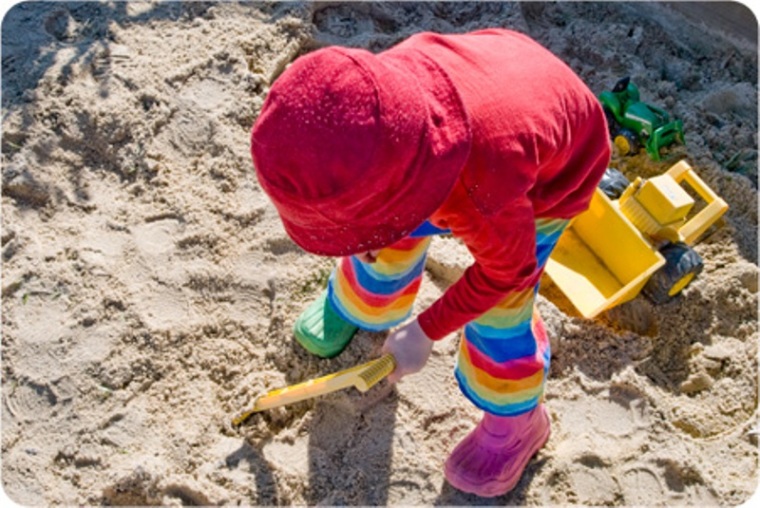
I overheard the following exchange in the pre-school sandpit one morning, when I was substituting as a parent helper:
“Maia, here are your undies. Please put them on,” says the parent helper in a placatory voice, and handing the naked child her underwear.
“No, I don’t want to,” responds the girl, in a similarly congenial tone.
Then follows drawn-out negotiation, with the parent helper failing to convince the child of the necessity of wearing her underwear.
(Children do at times shed their clothes during play, but it is one of the rules of the pre-school centre that underwear has to be worn, for the child’s own safety. Maia is one of the older children, and able to be left at the centre without one of her own parents or carers remaining with her.)
The encounter ends with the parent helper moving away, as she has her own baby to attend to. Maia is still naked, and twirls her undies round and round in her hand.
What has Maia learned from this? Firstly, that her wishes are paramount, regardless of what another adult might say. She has learned that she doesn’t ultimately have to do what she is asked to do, regardless of what any rules might stipulate. She has learned that adults can be ignored, and that if she raises enough arguments she can win the encounter.
………………………………………………………
Shortly afterwards another parent helper arrives at the sandpit.
“Maia,” she says in a firm voice, “put your undies on please.”
Maia objects, just as she had done with the first parent helper.
“Maia,” says the second parent helper in an even firmer voice, “you have to wear your undies here. If you don’t, then you will have to wear nappies instead.”
Maia puts her undies on. She runs off with another child, who has now stripped down to her undies, and plays happily with her for the rest of the session.
What has Maia learned from this second encounter? She has learned that this parent is to be reckoned with, and that there are consequences if she doesn’t. There is no to-ing and fro-ing over an issue that is non-negotiable; instead a boundary has been enforced that she is expected to abide by.
She is also learning which adults are to be argued with and which are to be taken notice of.
Train a child…
The wisdom of the Book of Proverbs is seen in the proverb that states, ‘Train a child in the way he/she should go, and he/she will not depart from it when they are old.’
Parenting is very much about training a child. They are trained in physical and mental skills, social skills and in the development of various abilities. Obviously such training enables them to become functioning adults. They have to learn to fit in and work with others, and become valuable members of society.
That’s nothing new.
Having a choice
What is new, is the emphasis that is now being given in some schools of parenting, that a child’s choices are pre-eminent. Because being able to choose is a key element in many middle-class parents’ philosophies, it follows that they want their children to choose for themselves. The choices begin very early on, with food, clothing, activities, etc and as soon as they are able to articulate their wishes, the negotiation begins. This is particularly the case with children who do not have any siblings, or may have only one.
Giving children choices is a necessary part of their learning to function as adults, as decision-making is an important skill. It is when they are given choices about non-negotiables (as with the wearing of undies at pre-school), or when there is too much choice offered to them that they develop into a little ‘prince’ or ‘princess’, that problems can arise.
Our preferences don’t always prevail
If children develop the mind-set that they can negotiate their way through life they will soon encounter a world where negotiation is not applicable. In that world their preferences don’t or can’t always prevail. School is an obvious example. But any sport, club, transport system, or cultural activity, has its requirements, and as adults they find that any local council or national government has its regulations or laws which are binding.
Children who are always allowed to choose, especially during times when they need to learn to comply, are not being properly trained. (However children who are always trained to comply, as in some sects, may find themselves all at sea, when it comes to making decisions. Alternatively, such children may rebel when they are older. A wise balance is needed.)
If children are properly and wisely trained ‘in the way they should go’, then they will be able to function well as adults, because they will not depart from that way when they are older.
Four-year old Maia and all her peers need wise and effective parenting, just as children always have. Let’s ask for wisdom for those we know navigating the challenges of parenting in an era marked by many conflicting voices.


Liz Hay is appalled by the amount of vitriol that is now being slung at any Christian who dares to comment on an issue raised in the media. Christianity is not only seen as an aberration, but is being increasingly regarded by some as a scourge to be removed from society. With the growing malevolence being expressed towards the church, it is no wonder that even going on to church property can be a daunting experience.
The balm of the natural world, and friendship with genuine and real people, that Liz experiences in her small village in the mountains is a wonderful antidote to anti-Christian comments.